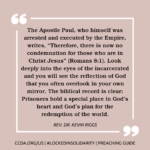Check out the new 2012 National Conference video.
It features CCDA board member Mark Charles talking about our theme for the conference, reconciliation. Mark has also written an entry for our blog about his experience relocating to the Navajo reservation. He discusses the idea of the Navajo greeting “Ya’at’eeh” as a step towards putting aside insecurities, and beginning a dialogue about Racial Reconciliation.
A Step Toward Reconciliation
“Ya’at’eeh.” That is what I should have said. Ya’at’eeh is a Navajo greeting. It is always accompanied with a hand shake, and, if the parties do not know each other, it is usually followed with a formal introduction. I had just finished my shower and was getting dressed when they walked in. Immediately I could feel my defenses go up. “Who do you think you are?” I wanted to ask. “You don’t even know me, or who I am!”
My family and I had moved back to the Navajo Reservation about a year earlier and we were living in a traditional Navajo hogan located out on a sheep camp.  We did this so we could gain a deeper understanding of my Navajo culture as well as experience a life that was not uncommon for our people. We were six miles off the nearest paved road on a dirt road living with no running water or electricity. I was working at that time as a computer consultant. Much of my work I could do from our hogan, but I also occasionally had to travel into ‘town’ to meet with clients. On those days, I would usually go in early and stop by a local gym where, for a fee, I could take a shower and get cleaned up. This was a common practice for our rural community, and by doing this I felt a deep sense of affinity towards others who were in the same boat as me and even a sense of pride of where I came from.
We did this so we could gain a deeper understanding of my Navajo culture as well as experience a life that was not uncommon for our people. We were six miles off the nearest paved road on a dirt road living with no running water or electricity. I was working at that time as a computer consultant. Much of my work I could do from our hogan, but I also occasionally had to travel into ‘town’ to meet with clients. On those days, I would usually go in early and stop by a local gym where, for a fee, I could take a shower and get cleaned up. This was a common practice for our rural community, and by doing this I felt a deep sense of affinity towards others who were in the same boat as me and even a sense of pride of where I came from.
As I was getting dressed some white men came into the locker room, they were at the gym for more than a shower; they were there to get some exercise. They looked like they lived in town and were regular members of this particular gym. But for some reason, I saw them very differently that morning. I suddenly felt very aware of the fact that I was there only to shower, and I feared that they too knew I was from the reservation and was there because I had no running water at home. I feared they were looking down on me with contempt and disgust (even though they did nothing to indicate such an attitude). I had this urge to tell them angrily that I probably had a better education than they did (I graduated from UCLA) and that I probably earned a higher hourly rate than they did. These thoughts surprised and shocked me. I had never before felt such intense feelings of insecurity and fear of being judged over the color of my skin. After they left the locker room my emotions subsided, and I was left to myself, pondering where those emotions had come from and not knowing what I was supposed to do with them. These men never spoke to me, nor I to them. This entire ordeal was played out only in my mind but is served to drive a wedge into my heart that caused me to emotionally isolate myself from the dominate society, an isolation that took me years to overcome. But it also opened a door for me to understand an aspect of Racial Reconciliation that I had never considered before.
Living on the Navajo Reservation feels very lonely. Our nations and peoples have been pushed aside to scraps of land that are largely unwanted and out of the way. As a result a majority of our country is unaware that our Native communties exist. And of the people who are aware most of those who come to visit us are those coming to give us charity or to take pictures at the ‘Native American zoo’. Very few people actually come for friendship.
As a result a majority of our country is unaware that our Native communties exist. And of the people who are aware most of those who come to visit us are those coming to give us charity or to take pictures at the ‘Native American zoo’. Very few people actually come for friendship.
The temptation is to stay on the reservation and remain silent – to stew in my hurt and allow my emotions to fester. It is tempting to say, if no one remembers us, than we should just forget about them. But that will not lead to reconciliation nor is it the will of our Father in heaven. And God has continually called me to step off of our reservation and to give myself to relationships. Not to assimilate and ‘fit in’ with everyone else. But to introduce myself as a Navajo man and invite people into friendship.
This is not the final solution. It is a step. It is only an entry point into a much larger process and a much bigger dialog. But we have to start somewhere. Our world, our country, our churches and our people are divided. There are generations worth of injustice, shame, hurt and anguish that drives fear into our hearts and fuels our isolation. And we are frequently just sitting in silence and stewing in our insecurities. I am not offering a solution, but rather a step. Can we stand up, put aside our insecurities, extend our hands and say “Ya’at’eeh”?



